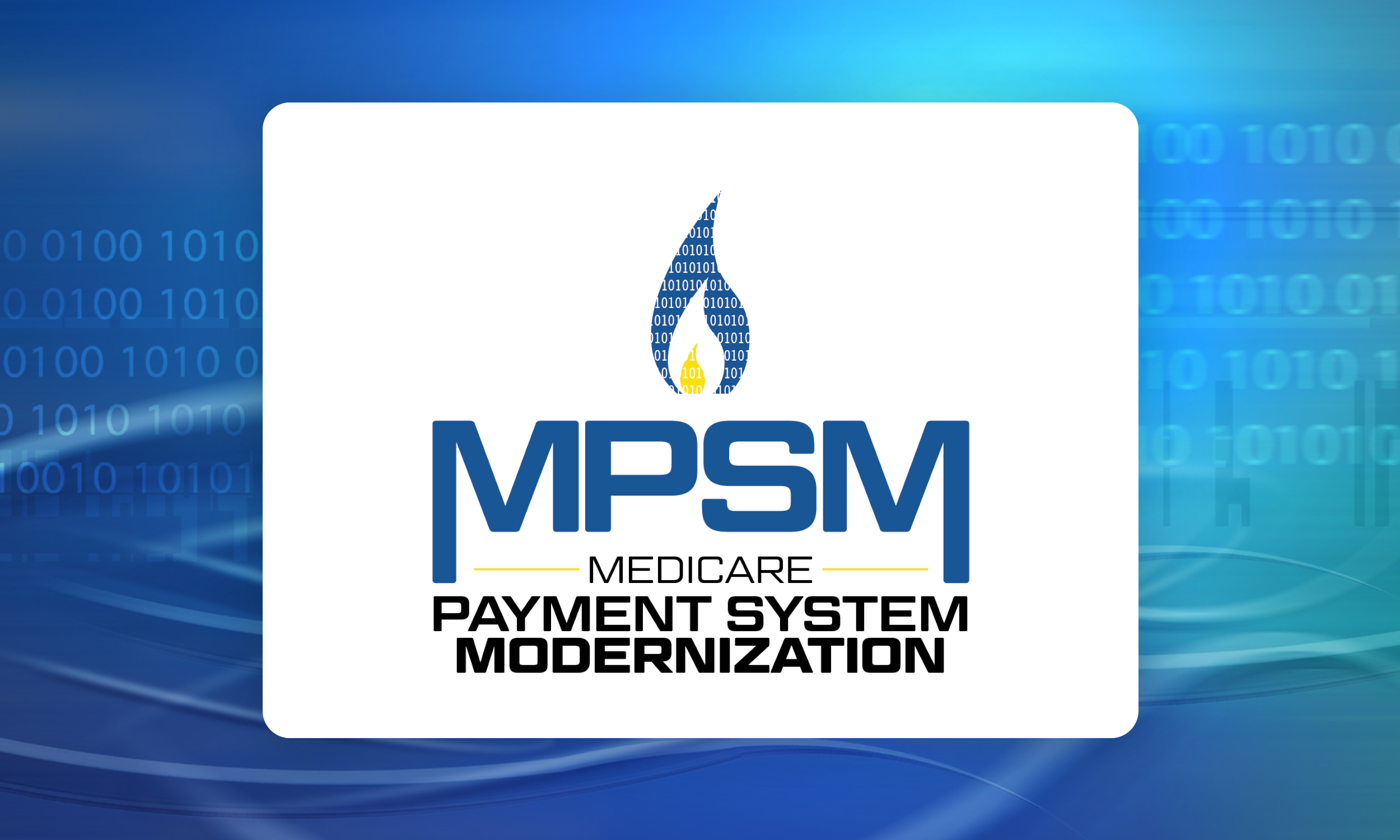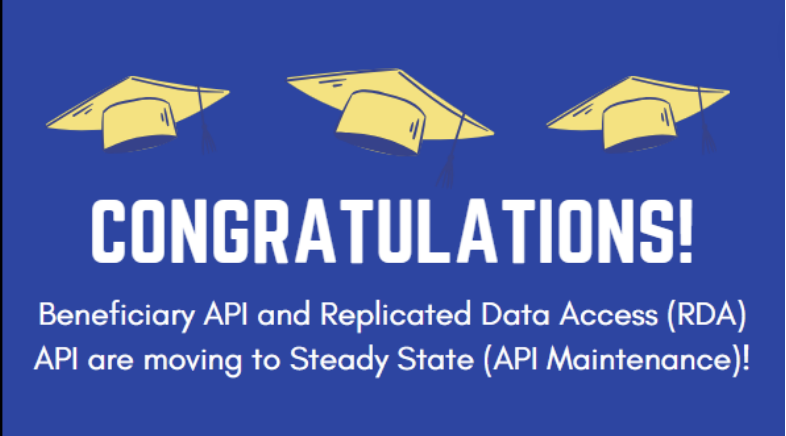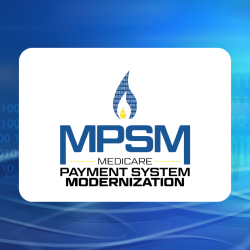MPSM Newsletter - July 2023

Bene API and RDA API moving to API Maintenance

Since the launch of the MPSM program, several products and APIs have been developed through the consolidated effort of multiple ADO teams. Two of these product teams, Beneficiary (Bene) API and Replicated Data Access (RDA) API, have recently reached an important milestone. Beginning Q4 FY2023 these two APIs will transition to steady state mode, also known as Operations and Maintenance (O&M). This transition will allow for the APIs to support its users by maintaining its current functionalities.
The Bene API delivers real-time access to information on Medicare beneficiaries providing details on beneficiary biographical information, Medicare Secondary Payer (MSP) information as well as current and historical instances of all Health Insurance Claim Numbers (HICN) and Medicare Beneficiary Identifiers (MBIs) associated with a beneficiary. With the completion of this work, Bene API transitions to steady state by September 2023. Prior to that date, the team will work to educate the team responsible steady state maintenance, on the value, benefits, and usage of the Bene API so there is awareness about how the Bene API functions and an understanding of how it fits into the MPSM ecosystem.
RDA API, which was initiated with the goal of providing internal CMS teams with near real-time access to Part A and Part B claims data from FISS and MCS, is also “graduating” to steady state in Q1 of FY2024. This API makes a high volume of claims, (around 17M claims changes each day!), available 24/7 in near real-time.
As part of the shift to steady state mode, the RDA API team is focused on ensuring critical documentation is accurate and accessible. Both ADO teams stress the importance of knowledge transfer and documentation to ensure a smooth transition. Congratulations to all the Bene API and RDA API team members! This esteemed graduating class will soon be followed by Provider Data Service (PDS) and Mainframe Cloud API Migration (MCAM) who are also expected to transition to steady state sometime in the near future.
What’s Coming Up in FY23 Q4? Check Out the Product Reference Sheet!
The FY23 MPSM Q4 Quarterly Planning session was held June 20-22, 2023. The MPSM product teams presented their FY23 Q3 accomplishments and discussed goals and dependencies for Q4.
The MPSM Product Reference Sheet (PRS) has been updated to reflect the progress made during FY23 Q3 and plans for the next quarter.
Click here to view the latest FY23 Q4 PRS!
Leadership Spotlight : Charles Watson
 "We Are MPSM" provides an opportunity to take a glimpse into leaders and product managers’ vision of MPSM, hear their views on the importance of modernization, and learn some fun facts about them along the way. The series continues with Charles Watson (pictured right), Deputy Director of the Division of Medicare System Modernization (DMSM).
"We Are MPSM" provides an opportunity to take a glimpse into leaders and product managers’ vision of MPSM, hear their views on the importance of modernization, and learn some fun facts about them along the way. The series continues with Charles Watson (pictured right), Deputy Director of the Division of Medicare System Modernization (DMSM).
Charles has worked in IT since the 1980s and has been with CMS since 2010. Charles reflects on his first job in IT and how it has impacted his approach since.
“I can recall my first job as a Field Service Engineer performing “Office Automation” – Installing Local Area Networks (LANs) and replacing typewriters with word processor terminal and impact printers. As I was introduced and required to quickly learn new technology, I knew that the crux of my role moving forward would be training, coaching, and information sharing. I’ve taken that approach ever since, seeking to mentor and train any and all who wanted to know, the wonder, usefulness, and possibilities, of an open mind.”
What is the Significance of Modernization for CMS?
The modernization of the Medicare Fee-For-Service claims processing system is essential for the mission of the Agency. With the rapid advances and application of data-science in the IT industry and the continued attrition of the Baby Boomer and now Gen X generations, the demand for responsivity and efficiencies of our transaction systems will only increase more and more. A modern system developed by modern minds is a requirement we dare not overlook.
Career Snapshot
I’ve been in government service since 2010, initially as a GTL/COR, then a Technical Advisor and now as Deputy Director for the Division of Medicare System Modernization. Prior to this, I worked for a major computer system vendor, wearing many hats, from hardware/software system repair, to training, to marketing/product management.
Your Career in 5 Words
Arriving, Thriving, Surviving, Serving, Savoring
This Year...
After having endured total knee replacement surgery, I look forward to two-mile walks around the lake near my residence…at minimum!
Past CMS Projects
I was responsible for the oversight of the re-architecture of the HIPPA Eligibility Transaction System (HETS), provided technical oversight to the Division of Transactions, Application and Standards; and program oversight for the development of the Quality Payment System (QPP).
Fun Fact!
I enjoy visiting an art gallery as much as I enjoy watching a Ravens game!
Hobbies? What Do You Do in Your Free Time?
I enjoy chess, dominoes with my grandchildren, or a Sequence tournament with the Mrs.
I also take time out for introspection and straight-ahead jazz, with an occasional 1738 neat, and a Hemingway short story.
Team Spotlight: Strategic Design
The Strategic Design Team, or Strat Design as their friends call them, supports MPSM by researching and mapping out the elements of the Medicare payment systems using a human-centered and service design approach to understand pain points and find areas of opportunity.
Recently that has meant mapping the claims payment process to gain a deeper understanding and explore how CMS can begin to envision incorporating the Dental MVP, and what possibilities for modernization exist. We talked to the team about what they have been working on.
What is the Strat Design team working on that you are excited about?
Sumera Rownak and Alexandria Parker stated, “This year the team translated the complex set of system and human activities needed to correctly adjudicate Part B claims into 5 key questions and the distinct business outcomes needed to answer them, making claims adjudication much easier to understand. “
What are the 5 key questions and how will they be used?
The 5 core adjudication questions are:
- Who is Medicare paying and covering?
- What is Medicare covering?
- Why is Medicare permitted (or not) to cover this?
- How much will Medicare allow to be paid?
- Who owes what to whom?
We used this structure to prove a realistic beneficiary and healthcare scenario where a Part B dental service would be needed, coding the scenario onto an actual sample ADA Form Paper Dental Claim. The sample claim was adjudicated using the 5 key questions to determine which existing Part B adjudication rules would need to be applied and how the claim would be priced, and co-pay/co-insurance applied.
What is on the horizon in Q4?
The team is beginning to piece together the research findings to build a multi-layer service blueprint that offers a high-level view of the claims payment process through varying levels of granularity. The blueprint will illustrate the front-stage interactions between various users like providers and MACs and link these interactions to the backstage actions, systems, and processes that support the frontstage. We are so excited to continue learning and building this in Q4 so that MPSM can use it, and we all can have a better end-to-end view of this process.
We are also planning to take a deep dive into where the human needs are in the new MVP, and at what points in the payment process there will be a need for support and education.
What to Expect During HCD Hour On July 27
The Human Centered Design (HCD) Hour occurs every other Thursday at 10:05 AM ET and focuses on user research findings and strategies. This forum serves as a knowledge sharing platform where ADO teams take turns presenting and hearing how the latest research benefits MPSM. There are two exciting HCD Hour sessions in July showcasing research conducted by the Digital Services at CMS (DSAC) and Strategic Design teams.
- Strategic Design HCD Hour – Thursday, July 27at 10:05 AM ET - The Strat Design team will present a Service Blueprint Walkthrough of the various states of a Part B claim! The team’s research study examined how a Part B claim can change from the time it is received until it is paid (or denied and subsequently if it gets appealed) and offered insights into the capabilities that a modern dental claims payment system might support.
Join these biweekly sessions to learn more about the exciting research these teams and others are working on!
For the schedule of presenters or to watch past HCD Hour recordings, click here. To receive the invite, reach out to Sumera Rownak.
Take a Minute to Tell Us How We're Doing
July marks the first anniversary of PlanetOIT, and the OIT Communications Team wants to know if you're finding our website and weekly bulletins useful.
Please take a one-minute survey about how you use PlanetOIT and what we can do to make it better for you.

